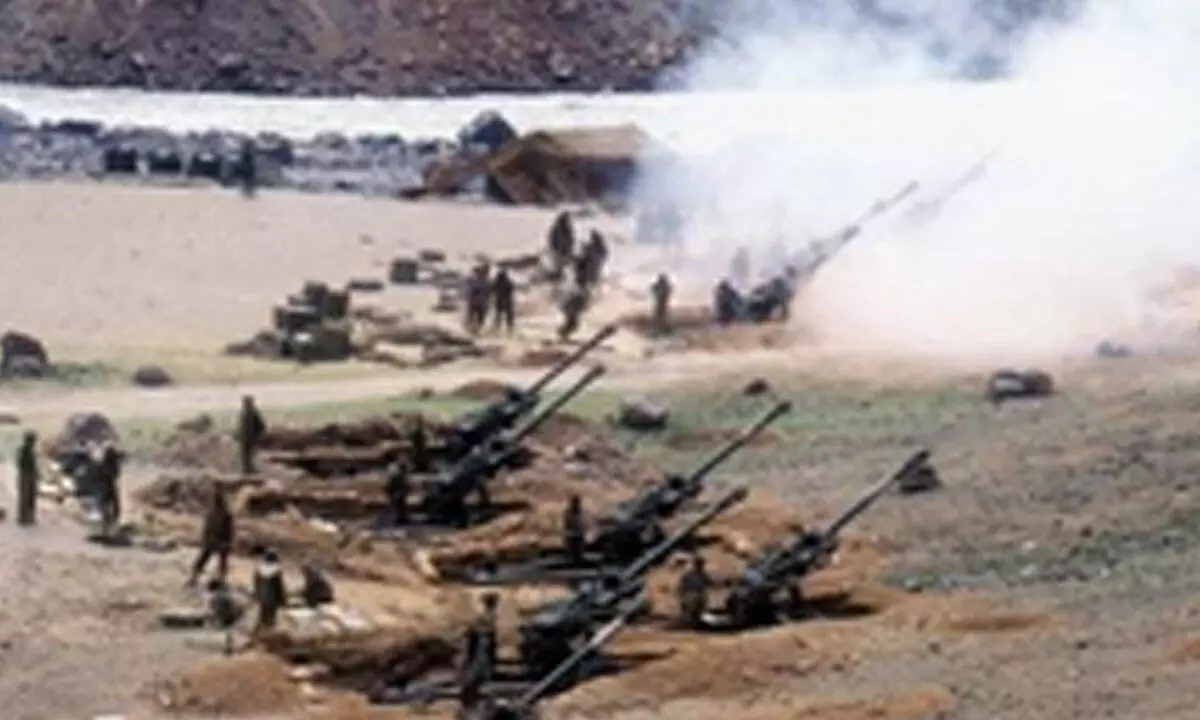Kargil War was an 'ill-conceived blunder', admit former Pakistani military officers
Share :

One of the many adventures in the Pakistan-India series of conflicts 'Operation Koh Paima', also known as the Kargil operation -- that was hailed as a success story by its architect and Pakistani military dictator Late General (retd) Pervez Musharraf -- is now being labelled as a "strategic blunder" and a "political disaster" by a majority of experts, including former military officers who were serving during the 1999 operation.
Islamabad: One of the many adventures in the Pakistan-India series of conflicts 'Operation Koh Paima', also known as the Kargil operation -- that was hailed as a success story by its architect and Pakistani military dictator Late General (retd) Pervez Musharraf -- is now being labelled as a "strategic blunder" and a "political disaster" by a majority of experts, including former military officers who were serving during the 1999 operation.
"The plan was a blunder and a massive failure. It not only turned out to be a disaster, it also violated the Lahore Summit agreement between India and Pakistan. Also, because the Pakistan Army denied its involvement, even refused to accept the dead bodies of its own soldiers who were later buried by the Indian Armed forces, turned out to be more embarrassing and attracted more dishonour to the institution," says Colonel (retd) Ashfaq Hussain.
The Kargil conflict happened during May and July 1999. It was a decision, undertaken by some top military heads, who initiated the operation without even taking their own Prime Minister at the time, Nawaz Sharif in confidence.
The main target of the operation was to cut off the link between Kashmir and Ladakh, block the National Highway-1 and force the Indian forces to compromise their positions from the Siachen glacier. The military minds were of the view that the operation would force India to retreat and come to table talks for resolving the Kashmir dispute on Islamabad's terms.
"On one side, Pakistan was faced with international pressure and on the other side, the plan failed miserably as China did not act as per Islamabad's assumptions. Our then Foreign Minister Sartaj Aziz got a cold shoulder from China along with all others because Islamabad's version that it was not its Army but the Kashmir freedom fighters at Kargil, was a story not bought by anyone," Hussain added.
At the time, General Musharraf was leading the operation while his team included Chief of General Staff Lieutenant General Aziz Khan, Commander 10 Corps Lt. General Mahmood Ahmed, and Forces Commander Northern Areas Major General Javed Hassan.
While the plan to execute the Kargil operation was the brainchild of a few military heads, the overall plan was bound to fail as it was based on wrong assumptions which were kept in hiding even from the Pakistani Prime Minister along with the country's Chiefs of Air Force and Navy.
Keeping in view that the normal practice of both Indian and Pakistani forces was to leave their posts at high altitude during the extreme weather conditions of winter snow and reoccupy them at spring, Pakistani forces and their proxies reoccupied the forward positions before the Indians and took control of the strategic heights of Kargil, Drass and Batalik.
The Indian forces then launched 'Operation Vijay' to retake their strategic posts. As the battle between the two sides gained heat, the Pakistani side took advantage of the higher peaks and responded to Indian artillery fire.
"We had the advantage of the higher peak position. We could spot them from the height and counter fire on them more effectively," said Colonel Retd. Ashfaq Hussain, author of the book 'Witness to Blunder' that details his first-hand experience of the time, sitting as an officer in the Inter-Services Public Relations (ISPR) in Rawalpindi.
The plan on Pakistan's side, limited to the few military minds, was that its occupation of the high peaks at Kargil would force the Indian forces away from Siachen and the international community would intervene during the early stage to normalise the situation, leaving Pakistan with gains along the LoC (Line of Control).
Nawaz Sharif, the then Prime Minister who claimed he was completely unaware of the Kargil plan at the start, seemed to act in a way that hinted otherwise. It seemed that he was aware of the plan but had no idea on the serious consequences of the stunt.
Sharif may have been of the view that if the Kargil operation goes as planned, then he would own up to it standing tall as the victor of Kashmir. But because of his limited information on the actual plan and lack of assessment on the counter-offensive strategy adopted by India, Sharif preferred to maintain being naive and unknown to the developments.
It was by the end of June that Kargil operation was established as a disastrous failure, with the US President Bill Clinton demanding Pakistan to immediately withdraw its forces from the Indian side of the LoC.
"Kargil adventure was a blunder. It was a much bigger blunder than the surrender of 1971," says Colonel (retd) Ashfaq Hussain.















